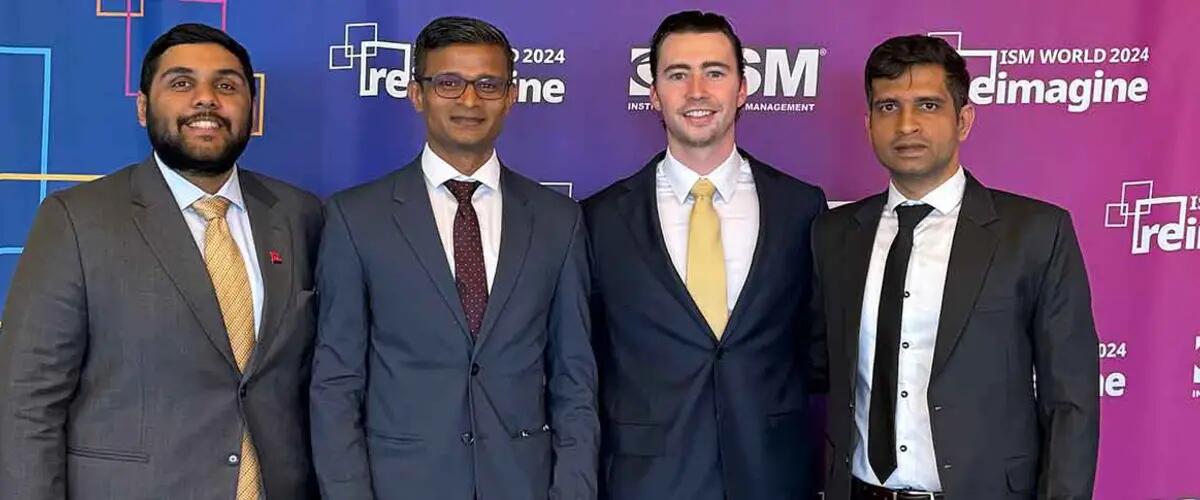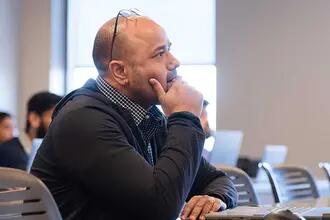
The winning team of first-year MBAS: Badri Venkat, Sharath Adanur, William Denney and Yashvanth Thippeswamy.
MBA students are first-place winners in international supply chain case competition
A team of Rutgers Full-Time MBA students won first place in an international case competition after besting 24 other teams with the ideas they proposed to solve a collection of real-world business challenges.
The students – Badri Venkat, Sharath Adanur, William Denney and Yashvanth Thippeswamy – were given 10 weeks to develop a comprehensive and concise presentation detailing ways to minimize a fictitious aerospace manufacturer’s problems sourcing raw materials, thwarting cybersecurity risks and developing an ESG-driven emissions reduction plan. Their ideas had to be explained in 10 minutes with no more than 12 slides.
After advancing to the final round on April 30, Rutgers faced teams from the University of Michigan, Wayne State University and Maastrict University from the Netherlands. The case competition was hosted by the Institute for Supply Management (ISM) and the final round was held during the organization’s annual world conference in Las Vegas.
“This global competition allowed our supply chain management MBA students to show their grit and how they have internalized the messages they receive at Rutgers toward being resilient and resourceful,” said Supply Chain Management professor David Dreyfus who coached the students.
The team’s strategy was to assign an area to each student based on his strengths. “The fact that we knew each other well and we knew each other’s strengths helped,” Thippeswamy said. During regular meetings, they shared information, and critiqued one another. “There was a lot of playing devil’s advocate at every step,” Venkat said.
Denney agreed, adding that while each team member focused on an area of the case, the team was well versed on every aspect. “I think it all came down to our preparation,” he said. “When you know the material inside and out after weeks of research, that can totally build your confidence.”
The ISM case competition came on the heels of another competition at Texas Christian University. Three members of the team competed at TCU and while they didn’t win, it prepared them and allowed them to improve upon their presentation and how they answered questions. In both case competitions, the team was coached by Professor Dreyfus. “He was there every step of the way,” Venkat said.
Venkat and his teammates believed that by tying their proposed solutions to the company’s financials – how much the actions would cost and how those costs would impact the company’s operations – may have clinched their win. “Every point of the case was addressed,” Venkat said, “and we tied everything to the financials in the end.”
The students all expressed an appreciation for the case competition experience, to apply classroom lessons to a real-world problem and to learn other skills that they will take into the workplace. “In class, what you learn is very siloed,” Thippeswamy said. “In a case competition, you get to see how different functions come together. Case competitions give you an opportunity to understand the larger perspective of the whole business.”
Venkat said everything comes into play in the experience. "Finance, supply chain, the aesthetics of a presentation, all of these things matter," he said. "The soft skills and the hard skills at the same time."
The ISM case competition, happening against the backdrop of a major conference, also offered the opportunity for the students to network with professionals, Adanur said.
Press: For all media inquiries see our Media Kit


